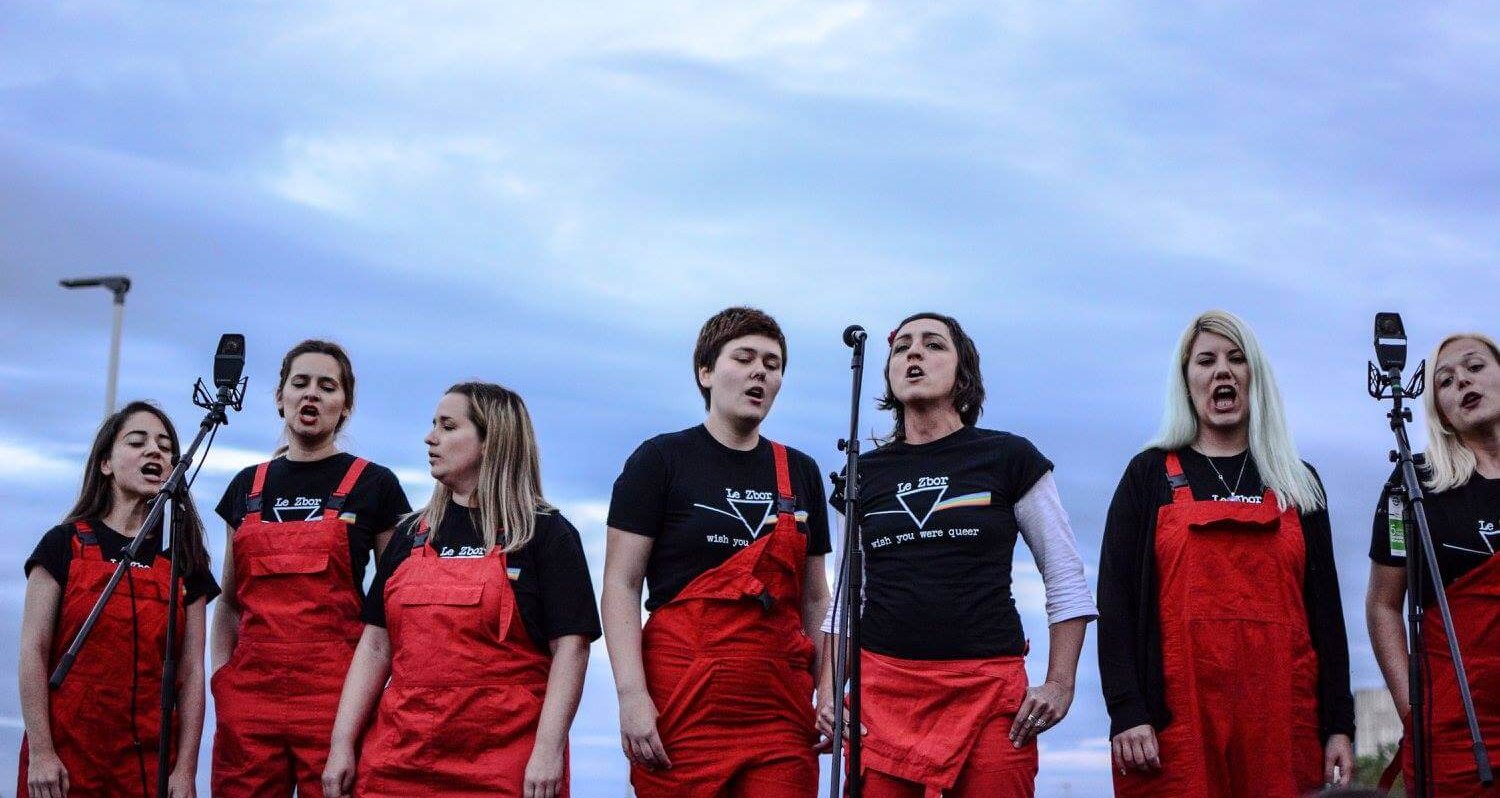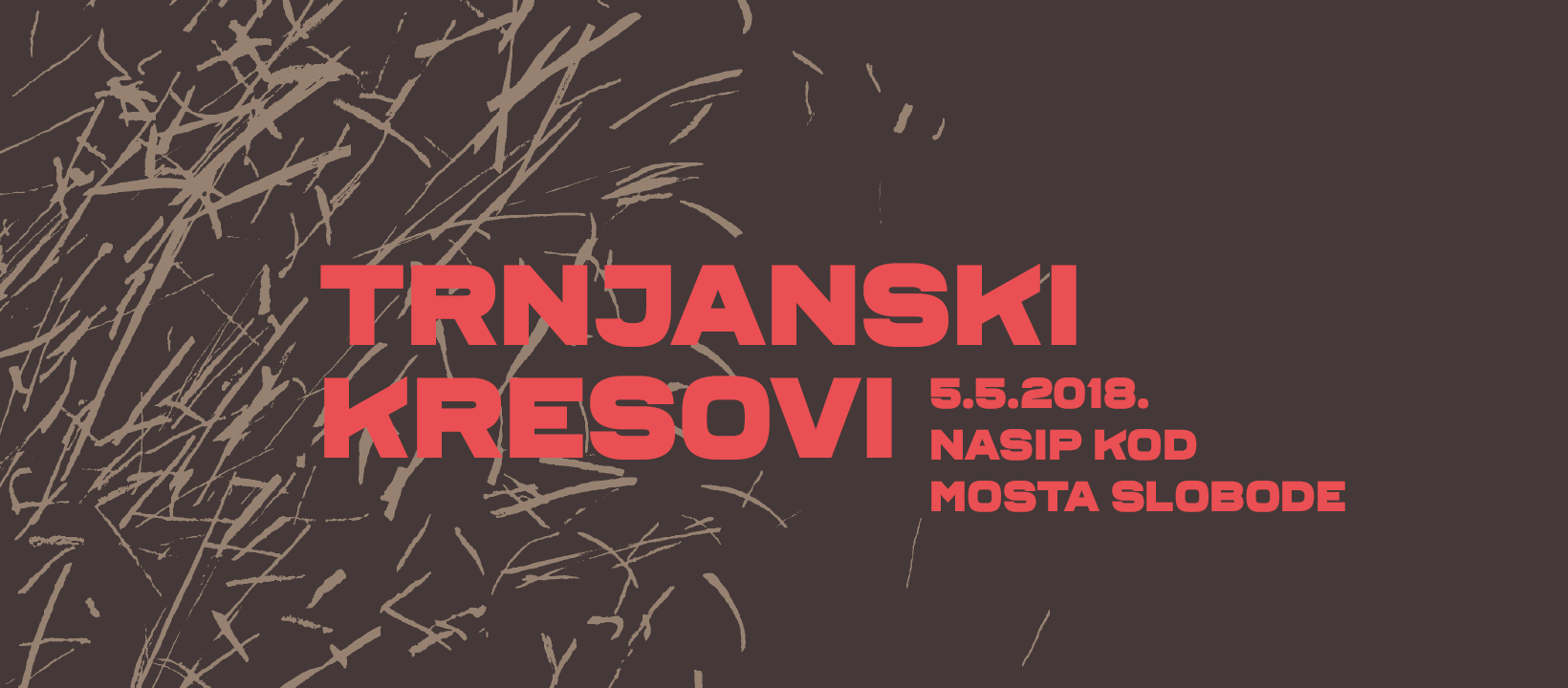It was a sunny day, unusually hot for May. At noon, the fire truck was already there. Activists with workers’ gloves were building the bonfire. It looked a little small once the construction was finished. “Are we sure that it will burn like it should? Well, the fire might be enough for us. After all, who knows how many people will show up?”
By the end of that night, between 2000 and 3000 people were gazing at the blazing wood. The fire itself wasn’t actually that big, but it was still enough to highlight the reason behind the event, and to warm up the hearts of the people, making the evening very emotional.

This event, known as Trnjanski kresovi (Trnje Bonfires), took place on 8 May 2015 on the Sava riverbank in Zagreb. It wasn’t an ordinary May, it wasn’t an ordinary year and most of all it wasn’t an ordinary location. That year the Croatian capital was celebrating the 70th anniversary of its liberation from fascists in World War II. To say that Zagreb was celebrating, though, might not actually be very accurate. Unlike in some other European cities and countries, where liberation is widely celebrated, for a vast majority in Zagreb, the 8 May is an unrecognized date, neglected by both local and national government. Nonetheless there were and are still citizens in Zagreb (many of them coming from all around the region) who would rather stand and watch the bonfire than the rapidly spreading fascistic fire in society.

The main initiator of the initiative was the organisation, the Female Antifascists Network Zagreb (Mreža antifašistkinja Zagreba in Croatian, MAZ for short), established in 2007 as the association of youth anti-fascists, whose aim was to gather anti-fascist citizens, especially young people, to actively work on anti-fascist values and fight against all forms of discrimination and intolerance in society. The network consists of both male and female activists, but the name aims to promote the feminine form of the Croatian word for anti-fascists, rather than the masculine form, which is often seen as the “neutral” version. We spoke to them as a collective.
“Everything started as an urgent reaction to the events in Croatia and the region, especially during and after the nineties, when the tolerance and encouragement of right-wing tendencies was largely promoted by the political and economic elites. Moreover, constant historical revisionism included indirect or direct celebration and glorification of the Independent State of Croatia and the Ustasha regime (1941-1945), established as a local satellite of the Third Reich, shortly after the occupation of the Kingdom of Yugoslavia”, they told us.
“In Croatia, we are still witnessing the systematic destruction or neglect of an extremely valuable anti-fascist and socialist heritage in public space (monuments, architecture, literature) resulting in the new generations born in the nineties and after not having any basic knowledge of their own history. Instead they are widely indoctrinated by far-right politicians, teachers and priests” they continued. For this reason, MAZ’s work implies the production of knowledge as well as the creation of a physical place for gathering different organizations and individuals to make stronger and more intense activist connections.

This week we are approaching the fourth edition of the celebration. Whether it will be the largest bonfire since its renewal remains to be seen, but the flame will again blaze in Zagreb on 5 May. Within four years, this celebration has proven to be one of the most important events in Croatia and in the Balkan region with a strong and open anti-fascist message. Once again the emphasis is on the need for collaboration between different cultural and activist organisations, associations, artists and collectives.
In fact the idea of commemorating liberation with the bonfire is not new. In Yugoslavia the tradition was once a popular open air festival situated in Zagreb and was often referred to as the “socialist Woodstock”. At the very same place, on the riverbank of Sava, partisan troops on 8 May 1945 entered into the city. This bridge was later symbolically named Most slobode, the Liberty Bridge. In 1978 the first Trnje Bonfires were organised next to the bridge.

“These celebrations were once maintained from 1978 up until the end of the 80s, from when it would be forgotten for decades. We wanted to make clear that Zagreb is and will remain an undefeated city,” say the activists from MAZ. The term undefeated is not incidental. For numerous years this word was proudly used to commemorate Zagreb as the city which liberated its streets from fascism. Decades later, MAZ will give the very same name Undefeated City to its journal.
Gathering in order to celebrate the victory against the fascistic occupation shouldn’t, of course, be anything controversial. Yet today, given the current climate in Croatia, it seems like a form of civil disobedience. In March 2018, for example, thousands of Croatian far-right supporters marched in Zagreb to protest against the “Istanbul Convention” (later ratified in 29 countries) saying that the convention was “against Christianity.” Later, in April, another rally was organised in Split, with the crowd claiming that the document would impose a new totalitarianism on the country. Strong messages were directed against the government, but as it often goes hand in hand in Croatia, some protesters were using the opportunity to use the slogan, ‘For Homeland, Ready’, which was used during the Independent State of Croatia in the World War II by the Ustasha and corresponds to ‘Sieg Heil!’.
This time around, in the political mishmash, far right supporters together with the Catholic Church were suddenly against the (far) right government. When the Istanbul Convention was ratified by the Croatian Parliament just a few days after it was with a bitter taste; an interpretative statement was added explaining that the convention does not oblige Croatia to introduce “gender ideology” in its legal and educational systems, nor does it oblige it to change the Constitutional definition of marriage.

A few weekends ago, for the third year in a row, the majority of the biggest victims’ groups from the Croatian concentration camp Jasenovac (Serbs, Jews, Roma and anti-fascists) boycotted the official commemoration and organised their own. Their accusations were clear: that the state has been tolerating historical revisionism of the country’s WWII fascist government. In 2016 a plaque with ‘For Homeland, Ready’ was installed in Jasenovac. Two years later, in February, the notorious government-formed Council for Dealing with Consequences of the Rule of Non-Democratic Regimes shockingly proclaimed that the salute ‘For Homeland, Ready’ can be tolerated in exceptional circumstances when commemorating the army units that were using it in the 90s – despite the fact that the slogan is unconstitutional under the country’s law.
For activists from MAZ, these messages, among many others, are an alarm for the resistance. “Despite the Declaration of Anti-fascism adopted in 2005, which confirms that Croatia is committed to anti-fascist and democratic values, in the past several years, in the public space, there is more frequent relativization of the Ustasha regime. Anti-fascism has become a dirty word. There is a strong tendency to deny the Holocaust and for people to close their eyes in front of the many terrible crimes that Ustasha have committed,” activists from MAZ point out.
Back in 2015, while Europe and the rest of the world were celebrating the victory of WWII, the Croatian government remained silent… and continue to be so. But in the past four years, thousands and thousands of people have gathered around the bonfires to show that they won’t remain silent.
MAZ in particular are far from silent, and this is true throughout the year. “Among other actions, many of them the guerilla ones, once per year we are organising the Solidarity March to draw public attention to certain social and economic policies that exclude, disrupt and discriminate various social groups that are experiencing violence, hatred and discrimination. Marching is our tool to show solidarity with the oppressed and discriminated groups.”

The event Trnjanski kresovi is not concerned with attracting activist only circles, but aims to gather citizens from all walks of life. “Starting from 2015, in cooperation with other organizations, we have been increasing the number of bonfires (there were dozens in the 80s) and accompanying them with a diverse cultural and artistic program, workshops for all ages, exhibitions, film projections, and choir performances, and a night program including the Antifa Night concert in the nearby club, Močvara,” they add.

In this year’s manifesto MAZ has a clear message for everyone: “No matter how hard oppressive and reactionary forces of this society are working against us, our rights will not be deprived, our strength and fight will not be undermined, and our history, the history of resistance and the struggle for better tomorrow will not be taken away from us.” Put another way, as one activist from MAZ once indicated, “the future might be uncertain, but the struggle continues!” This year, the anti-fascist bonfires will once again be a reminder that there are many other fires that need to be extinguished.
*Lead image credit: Ana Labudović. All rights reserved
![Political Critique [DISCONTINUED]](https://politicalcritique.org/wp-content/uploads/2015/09/Political-Critique-LOGO.png)
![Political Critique [DISCONTINUED]](https://politicalcritique.org/wp-content/uploads/2015/09/Political-Critique-LOGO-2.png)